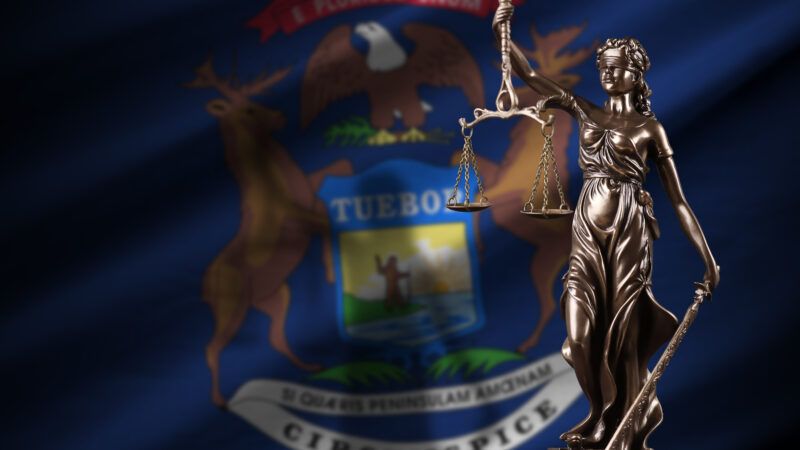Border Cops Try To Make an End Run Around Attorney-Client Privilege
Detroit lawyer Amir Makled has confidential client data on his phone. That didn’t stop U.S. Customs and Border Protection from trying to search it.

Attorney-client confidentiality is one of the oldest pillars of American justice. Americans not only have a right to talk with a lawyer, but also to talk privately with the lawyer. After all, what good would it be to ask for legal advice if the police could use that conversation against you?
U.S. Customs and Border Protection (CBP) asserts a very different principle: that your privacy rights disappear at the border. CBP policy gives officers the right to seize and search any electronic device that passes through customs. While the agency claims that copies of any attorney-client documents will be "destroyed" after a search, it doesn't recognize limits on its ability to collect and copy those documents in the first place.
Detroit lawyer Amir Makled got a glimpse of that policy in action while coming back from a family beach vacation in the Dominican Republic on Sunday. As first reported by the Detroit Free Press, agents held Makled for 90 minutes at the airport while they demanded to go through his phone. Eventually, he let them look at his contacts list, though he wouldn't tell them whether specific people were his friends, relatives, or clients.
CBP seemed to be waiting for Makled when he got back, he tells Reason, because staff at the passport control booth asked for a "TTRT agent," which may stand for Tactical Terrorism Response Team. Makled was then brought into a back room with a plainclothes officer who refused to give his name and told, "we know that you're an attorney, and we know that you take some high-profile cases," according to Makled.
His firm, Hall Makled, specializes in civil rights, personal injury, and criminal defense work. Makled says that the only high-profile client he can think of is Samantha Lewis, a protester charged with "resisting and obstructing police" at a Palestinian rights protest at the University of Michigan. The decision by Michigan Attorney General Dana Nessel, a Democrat, to charge campus protesters with felonies was a major controversy last year.
Makled claims that CBP agents didn't give any other reason for detaining him—and immediately demanded to see his phone. "Why don't you just tell me what it is you're looking for, and I can determine if I'm going to give you the answer?" Makled says he asked the officer. "And [the officer] said it doesn't work that way. I'm not going to allow you to tell me how to dictate this interview."
CBP policy calls on officers to "seek clarification, if practicable in writing, from the individual asserting this privilege as to specific files, file types, folders, categories of files, attorney or client names, email addresses, phone numbers, or other particulars" about documents protected by attorney-client privilege. And that's exactly what happened.
"They handed me a legal pad and said, you know, write down what you think is going to be privileged and we won't look at that. I said to them, what a futile exercise. How ridiculous does that sound?" Makled says. "I'm not going to spend any amount of time telling you what is privileged and what isn't. Everything is."
When a traveler asserts attorney-client privilege over an electronic device, officers are supposed to contact the agency's own lawyers, according to CBP policy. The search "will occur through the establishment and employment of a Filter Team composed of legal and operational representatives, or through another appropriate measure with written concurrence of the CBP Associate/Assistant Chief Counsel office," the policy states.
It's not clear whether CBP actually followed this procedure in Makled's interrogation. Makled says that "there was a lot of going back to the supervisor" and attempts to negotiate on what apps he would let CBP look through.
CBP Assistant Commissioner for Public Affairs Hilton Beckham confirmed to Reason that Makled was "flagged" and consented to a "limited search of his electronic device." Beckham claimed that the interrogation was a "routine, lawful" process, that "all actions were conducted in accordance with established protocols," and that Makled was spreading a "blatantly false and sensationalized" narrative.
Beckham separately explained to the Detroit Free Press that electronic "searches are conducted to detect digital contraband, terrorism-related content, and information relevant to visitor admissibility, all of which play a critical role in national security. Allegations that political beliefs trigger inspections or removals are baseless and irresponsible."
But Makled is a U.S. citizen, not a "visitor," and CBP didn't provide any reason to believe that he was suspected of involvement in smuggling or terrorism. By his account, CBP was interested in him precisely because of the attorney-client communications on his phone—which government officials otherwise couldn't look at. Just as the Trump administration has used border enforcement to get around Americans' domestic First Amendment rights, it seems to be doing the same to the Fourth Amendment.


Show Comments (44)